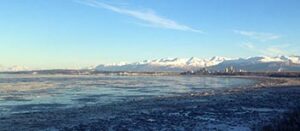
On March 24, 1989, the oil tanker Exxon Valdez ran aground on a charted rock, Bligh Reef, in Prince William Sound. The grounding occurred after the vessel left the designated tanker lanes to avoid icebergs reported to be in the area.
The tanker spilled an estimated 11 million gallons (257,000 barrels) of Alaska North Slope crude oil, enough to fill 17 Olympic-sized swimming pools.
Below are some of our recommended resources on the history of the spill.
What happened?
The executive summary of the Alaska Oil Spill Commission’s Final Report “Spill, the Wreck of the Exxon Valdez” has a synopsis of the incident and their investigation, which includes details about what went wrong. See also: Full report and appendices (Alaska Resources Library & Information Services (ARLIS) website)
Stats and FAQs:
The Exxon Valdez Oil Spill Trustee Council (EVOSTC):
- EVOSTC’s Oil Spill Facts
- Maps – Includes the extent of the spill and downloadable slides that show the movement of the oil for the first 6 days
- Stats, including miles of shoreline affected, cost of cleanup, and much more: Questions and Answers about the Spill
The Alaska Resources Library & Information Services (ARLIS) has an extensive collection, including some unique resources such as trial transcripts and audio recordings:
- Exxon Valdez oil spill collection
- An extensive 20-page list of links and resources for research: FAQs, Links, and Unique Resources at ARLIS (PDF). Please note that some of the links are outdated and broken, however most documents can be found via a search in ARLIS’ catalog: ARLIS’ catalog search for Exxon Valdez oil spill
Photo collections:
- Exxon Valdez Oil Spill Trustee Council’s collection
- ARLIS has posted their collection of photos on Flickr: ARLIS’ EVOS photos
Lessons learned:
Then & Now: 35 Years After the Exxon Valdez Oil Spill – This report reviews both what changes have been made since the spill and what’s left to improve.
The Spill: Personal Stories from the Exxon Valdez Disaster – This book features interviews with over 60 people who experienced the spill first-hand. They include Alaska citizens; government agency personnel involved with the spill and cleanup; elected officials who dealt with the spill; and oil industry personnel involved in the spill and cleanup. Contact the Council for a free copy: info@pwsrcac.org
History of Alaska’s Oil Spill Response Planning Standard – This report documents the history and intent behind Alaska’s standard for spill response plans.
History of the oil spill prevention and contingency plan in Prince William Sound – This report details how planning has improved since 1989, describes contentious issues and how they were resolved, notes significant trends, and documents remaining issues. The report also documents changes to the regulations and how regulations have been interpreted at different times.
Exxon Valdez Project Jukebox – The Council worked with the University of Alaska Fairbanks to archive this collection of audio and video interviews of people who experienced the spill firsthand. (UAF website)
Stories from a Citizens’ Council – This publication contains personal reflections on the formation and early years of the Prince William Sound Regional Citizens’ Advisory Council.
More questions?
We are happy to help find additional information, please contact us:
General questions and requests: info@pwsrcac.org
Media requests: Please contact the Council’s Director of Communications.
Educators: Please check out the Council’s Alaska Oil Spill Lesson Bank (free lesson plans for hands-on learning which meet applicable NGSS) or email the Council’s Outreach Coordinator.
 The Council held a Board meeting in Anchorage on Thursday and Friday, January 25-26, 2024.
The Council held a Board meeting in Anchorage on Thursday and Friday, January 25-26, 2024.